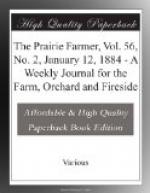But it is not so with the horse. Its value does not depend upon the quantity and quality of its flesh, milk, or bodily covering. Unlike the others its value depends upon the work it can do. Hence vigor and endurance are the prime essentials of a good horse. But as man has lessened the vigor and endurance of the hog, ox, and sheep, so he has of the horse. This is the invariable result of human art. Whenever man tampers with the work of nature he is certain to lessen bodily vigor. It could not be otherwise. For the course of nature, undisturbed and undeflected, is always towards the greatest health. Man changes the course of nature and the result is lessened vigor and endurance.
Man has improved some qualities of the horse. He has increased its speed, perhaps, but only for short distances. Our race horses of to-day would make a sorry record with those of days no longer past than those of the “pony express,” to say nothing of the couriers of centuries ago, because they have been made to deteriorate in vigor and endurance. We have ponderous, heavy horses to-day; but they can not do as much work before the plow or dray as those of the eighteenth century. We can not point anywhere to horses produced by breeding that are the equals of the horses of the days of chivalry. They lack not only in vigor and hardihood, but in intelligence. As the perfect symmetry of development by the course of nature has been destroyed by man the intelligence of the animal lessened. Whenever the hand of man has touched his equine friend it has been only to mar.
This decrease in the excellence of the horse can not be shifted from man to time. One instance alone demonstrates the unfairness of this. The Andalusians are now mere ponies, yet they are the descendants of those noble beasts ridden to victory by the Spanish chivalry in the days when the valor of the horse was as important as the valor of the knightly rider. Taken from their hills and valleys to serve in the haunts of men, and to be subjected to the arts of breeding, they have sadly degenerated. But the horses of the Spanish explorers of both North and South America escaped, and to-day the descendants of these same Spanish horses are, under the nurture of nature and nature’s ways, the superb wild horses of the new world. They are the work of nature; the Andalusian ponies are the work of man’s art.
As this degeneracy is the necessary co-existent of man’s breeding, so far as it is produced by this cause it can not be escaped. But a good part of the evil is not the necessary sequence of breeding per se. It is also attributable to errors in treatment so palpable and easy of correction that it behooves us to note and avoid them. In my next I shall briefly mention a few of the most important of these.
* * * * *




